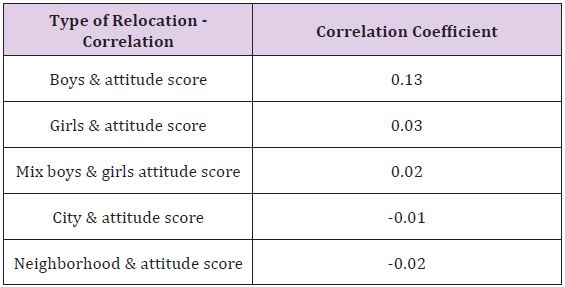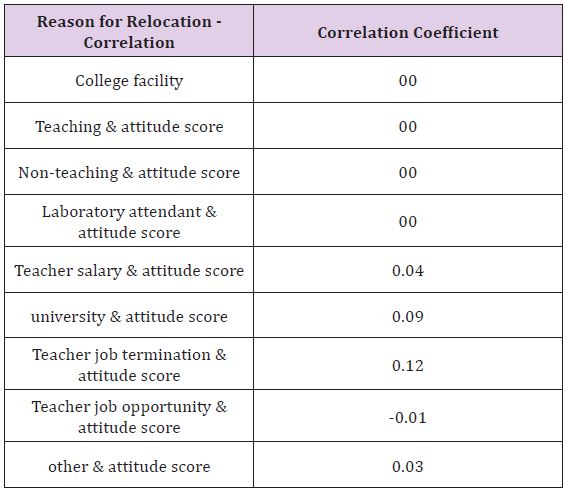Impact Factor : 0.548
- NLM ID: 101723284
- OCoLC: 999826537
- LCCN: 2017202541
Rahul Hajare*1, 2
Received: June 23, 2017; Published: June 30, 2017
Corresponding author: Rahul Hajare, Department of Quality Assurance, Rajgad Dnyanpeeth’s College of Pharmacy, Indian Council of Medical Research Department of Health Research Former Post-Doctoral Fellow, India
DOI: 10.26717/BJSTR.2017.01.000161
This study investigated a possible correlation between the individual variables of relocation experience and student attitude toward pharmacy profession. A sample of 200 students at first levels of B. Pharm course study at a major undergraduate pharmacy colleges in the pune university areas. In this study with the earlier reported that the reason for relocation may affect the students’ academic performance score (SAPS) with certain relocations such as those for voluntary reasons have associated with improved academic performance. The results of the study indicated that approx. 45% of the relocations involved a change of state. Most participants have only relocated once, and of those participants who have only relocated once. It has found that there indecisive impact correlation between the attitude score of those participants who have relocate and those who have likely to be relocate. In comparing the attitude scores in relation to the reasons for relocation, the results for most categories did not differ. Categories of interest has separation and decreased study level because these groups yielded attitude scores that has lower and higher, respectively, from the rest. While previous research supports a unclear relocation effect for separation, it seems uncharacteristic who relocated due to decreased teaching plan. We report here a source of comfort for the naïve B. Pharm first year students in class room and pharmacy colleges. A study has shown the outstanding importance of in students care in early stage. A first, study in 2015 provided indications that the students early phase could lead to relocation. And this, although it has the goal of all caregivers to recognize the study hunger students as such, and to allow a professional identity of students independently at the work place, because relocation basically means risks and stress for all concerned.
Keywords: Early life, B.Pharm students, relocation of students, naive B.Pharm students
Abbreviations: SAPS: Student’s Academic Performance Score
We report here the effects of relocation on naïve B.Pharm students from their class room to other place class room in pharmacy institutions have evaluated. Researcher interest in the health consequences due to relative deficiency identified and has well served by the series of paper [1,2]. This report shows the outstanding importance of in students care in the beginning of college life.
More detailed information on the extent (quantity) and reason (quality) about the transfer of B.Pharm first year students.
In order to overcome this information deficiency, a 27-questionwide questionnaires have developed and addressed to employees from class room and pharmacy colleges in 2016-17 academic sessions (Pune university areas pharmacy colleges and class rooms). The questionnaires have determined the frequency of relocation; the date; the address of the relocation; and the influencing factors which justify or moderate the transfers; The questionnaires have answered particularly by naïve students, non-teaching, approved and non-approved pharmacy teachers, also asked to adhoc teachers and temporary basis teachers also connected other teachers who have not on college diary, but taught B. Pharm first year students [3, 4]. The questionnaires have been answered in writing and in an online procedure. As far as possible and meaningful, the data of the total of 60 interviewees have clustered so that each institution has included as an average case in the statistical evaluation. In this way, B. Pharm first year class room and five pharmacy colleges of different sizes and raises have included in the statistical evaluation. The study has an exploratory character. The results have been reviewed by available supply data and further studies should be supplemented.
The following central findings have identified: In approximately 65-70% of the class room and approx. 70-75 % of the students in pharmacy colleges there have transfers of B. Pharm first year students. This would mean a total of approx. 200 students. Pharmacy colleges transfer B. Pharm first year students primarily to class room and only in very few cases in a conference hall. College employees have stated that most of their transfers have carried out within their college. In some cases, the relocation takes place in a adjacent class room. In the study, no clear preferences of the day of the week or of the time have identified. Physical facility impairments such as fan, tube lights, fresh air, drinking water, desk bench conditions, projector or the deterioration of the general condition such as cafeteria, reverse osmosis drinking water have been identified as the central reasons for relocations. In contrast, time table shuffling reasons such as theory adjustment, pre and post occupied theory, confusion, or depressive mood has also important expression. Both the achieved quality of the family integration as well as the cooperation with the students has an impact on possible relocation behaviour of the institutions.
Table 1: Correlation Coefficients for Type of Relocation [Correlation test in XLSTAT (Listed software)].

The better they succeed, the lower the relocation. Surprise test interventions two verses three have a medium to distinct influence. The relocation behaviour in the class room differs from that of the pharmacy colleges. The college facilities have much less prepared for physical deterioration. On the other hand, physical or mental challenges in pharmacy colleges have better managed. The influence of the teacher doctors, the relatives and the student has also lower in the class room. Basically existing professional shortcomings have regarded as more problematic for the relocation behaviour, it has acute professional shortcomings. This assessment all the breakpoints used in the study has relative to the fresher students in pharmacy colleges. In open questions, respondents have given the opportunity to provide information on how to avoid relocation. The following recommendations have formulated: forward looking planning To further develop college care; To improve cooperation with faculty and specialized faculty services; To improve the teaching attitude; To increase the number and efficacy of student care; Better pharmacy education; Prevention of inappropriate use of intensive care; Better and earlier counselling of relatives and students; Adaptation of premises; Building establishment of ethical teams; Basic facility; In order work; Running CC TV; avoid clash and slash lecturers; And finally to further explore the potential of new teaching model, Innovent study will indeed generate discussion on this important technological advancement (Table 1 & 2).
Table 2: Correlation Coefficients for the Reason for Relocation [Correlation test in XLSTAT (Listed software)].

For pharmacy colleges, they have even better place to deal with the knowledge of their students, so that B. Pharm students first year has not identified as “critique emergencies”, with all the problematic consequences. In the class room has quite similar. Here, too, the general units of care must be supported in such a way that B Pharm first year students have not yet moved into adjusting class room. It has hoped that with the introduction of a new law and education empowerment will lead extra protection correlate with teaching category based on outcomes, the situation for B. Pharm first year students in the class room and pharmacy colleges in India will continue to improve. This includes less relocation of B. Pharm first year students. The detection of reason also points to the fact that relocation belonging to multiple sub reason are circulating and giving rise to new bringing. This clearly indicates that the transformation in education in India has still needs close monitoring. This study investigated the correlation between the individual variables of relocation experience and students’ attitudes towards teaching. Since the India has becoming an increasingly mobile society, it has important to look at the impact of relocation. Previous research indicated that the reason for relocation may affect the students’ academic performance score. With this in mind, we set out to establish connections between types and frequency of relocation and perceptions about the importance of teaching model study among college students enrolled in pharmacy courses at various levels. Those prevention mechanisms include conduction of regular reviews of Pharmacy College setting as well as strict guidelines to follow. It has used to protect from unintended crowed with personal interest, I would like to request Hon’ble present prime minister to need of intervention of more important education advocacy specialist legal consultancy, which provides legal support and guidance to privately managed pharmaceutical institutions. Also provide a professional, affordable legal services law intervention. Education advocacy's services may be including specialist legal advice and support, preparation, negotiation and representation in the following areas:
§ Statement of Special Educational Need Pharmaceutical Institute (SSENPI)
§ Education Health & Care Plan Pharmacy Institute (EHCPPI)
§ Disability Discrimination
§ Exclusions
We declare no competing interest.


